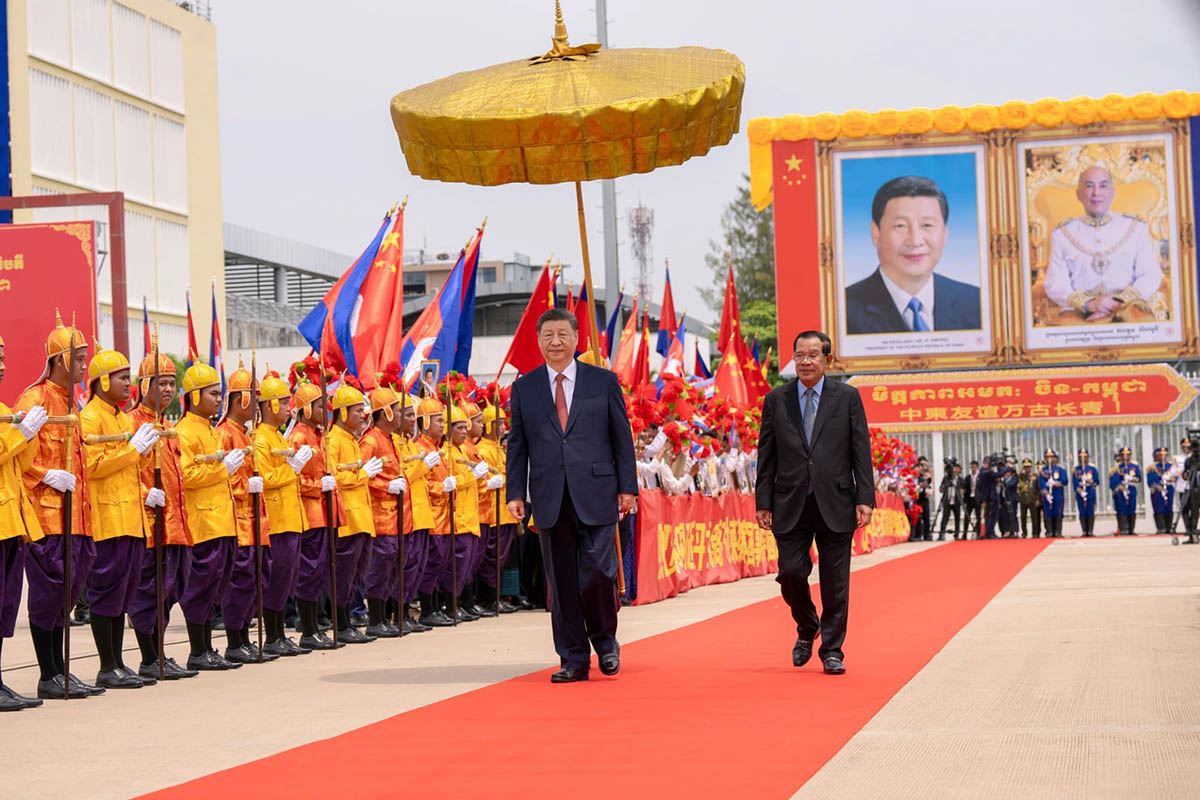
PHNOM PENH, CAMBODIA: Chinese President Xi Jinping on Friday concluded a two-day state visit to Cambodia, completing a three-nation tour that included stops in Vietnam and Malaysia. The visit comes at a time when all three Southeast Asian countries are facing economic challenges due to tariff proposals from US President Donald Trump.
China has significantly increased its influence in the region over the past decade, largely by leveraging its economic power. Beijing is presenting itself as a source of stability as Trump’s tariffs pose risks to export-driven economies, which depend heavily on the US as their largest market.
Cambodia faces some of the highest reciprocal tariff rates proposed by Washington. In addition to Trump’s universal 10% tariff, Cambodian exports to the US could be subject to a 49% tariff once the 90-day suspension ends. Vietnam could face a 46% tariff, while Malaysia’s rate is set at 24%.
“The timing of the visit is extraordinarily auspicious for China, falling just after the announcement of Trump’s tariffs, which have caused managed consternation in Cambodia and Vietnam, and upset in Malaysia,” Astrid Norén-Nilsson, a senior lecturer in the Study of Contemporary South-East Asia at Sweden’s Lund University, commented in an email interview on Thursday.
“Xi Jinping can now carry out the tour equipped with the moral authority and goodwill of a singularly constant friend and reliable trading partner.”
A summary of the visit issued on Friday by Cambodia’s Foreign Affairs Ministry made little mention of the trade crisis, instead emphasising bilateral relations.
“This milestone visit not only reaffirmed the unwavering commitment to the iron-clad friendship between Cambodia and China but also further strengthened and deepened the Comprehensive Strategic Partnership and win-win cooperation between the two countries,” the statement said.
During his stay, Xi had a royal audience with King Norodom Sihamoni and held meetings with Prime Minister Hun Manet and Senate President Hun Sen, Hun Manet’s father and predecessor as prime minister. It was Xi’s first visit to Cambodia since 2016.
Xi and Hun Manet presided over the signing of 37 agreements covering investment, trade, education, finance, information, youth work, agriculture, health, water resources, tourism, women’s affairs, and other sectors.
Cambodia’s rapid economic growth in recent decades has been heavily supported by Beijing.
China has been Cambodia’s largest trading partner for 13 consecutive years, with two-way trade reaching $17.83 billion in 2024, although the balance is heavily in China’s favour. It has also been Cambodia’s largest source of foreign investment and a major aid donor for 13 years.
Beijing’s strong support enables Cambodia to largely disregard Western criticism over its human rights record and suppression of political opposition. Cambodia, in return, generally backs China’s position on disputed territorial claims in the South China Sea and other contentious issues.
“The Cambodian side reiterated its resolute adherence to the one-China policy and that Taiwan is an inalienable part of China’s territory,” said the Cambodian Foreign Ministry statement. “Cambodia also expressed opposition to any attempts at interference in China’s internal affairs” — a reference to Hong Kong and Taiwan.
On social and development issues, the statement indirectly contrasted Cambodia’s position with that of the US, stating that “both sides acknowledged the global threat posed by climate change and committed to strengthening environmental protection and advancing clean energy collaboration.”
It also highlighted China’s assistance in clearing land mines left from past conflicts and cooperation in the health sector. Cuts in US foreign aid have affected these and other sectors.
The statement further declared that “both sides agreed to strengthen the cooperation mechanism between the armed forces of the two countries.”
Beijing helped finance an expansion of the Ream Naval Base on Cambodia’s southern coast, raising concerns that it could serve as a strategic outpost for the Chinese navy in the Gulf of Thailand.
The statement did not reference the base issue. Cambodia has repeatedly denied any agreement granting China special privileges or permission to establish a foreign military base.
Cambodia has said that warships from all friendly countries are welcome to dock at its newly built pier, provided they meet certain conditions. Japan announced on Tuesday that two of its minesweepers will visit the Ream base this weekend, marking the first foreign naval visit since the expansion project was completed.
By RSS/AP






